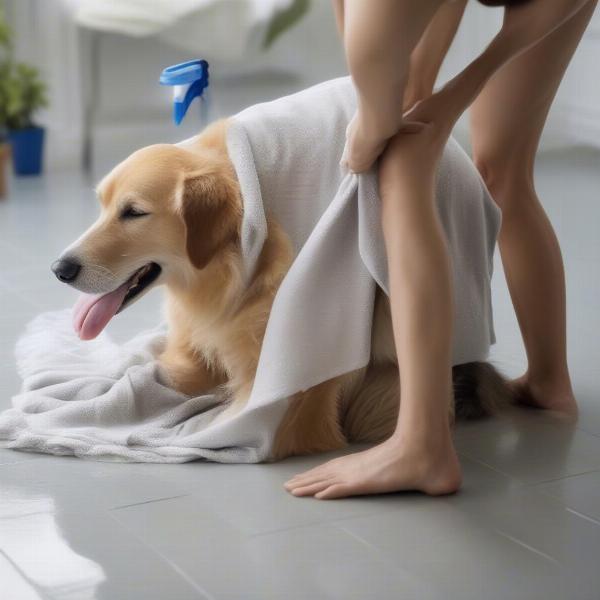Dog butt itching is a common problem that can be caused by a variety of factors, ranging from allergies to parasites. Understanding the underlying cause is crucial for effective treatment and prevention. This article will explore the common reasons why your dog might be scooting, licking, or biting their rear end, provide practical solutions, and offer preventative measures to keep your furry friend comfortable and itch-free.
Why is My Dog Itching Their Butt?
Several reasons can contribute to a dog’s itchy butt. Fleas and other parasites are common culprits. These tiny pests can irritate the skin around the anus, leading to excessive scratching and discomfort. Allergies, whether environmental or food-related, can also manifest as itchy skin, including the rear end. Anal gland issues, such as impaction or infection, are another frequent cause of butt itching in dogs. Poor hygiene, especially in long-haired breeds, can also trap fecal matter and lead to irritation. Less common causes include skin infections, tumors, and certain medical conditions.
Common Culprits: Fleas, Allergies, and Anal Glands
Fleas are a nuisance for both dogs and their owners. These tiny parasites feed on blood and can cause intense itching. Regular flea prevention treatments are crucial for preventing infestations. Allergies, whether to pollen, dust mites, or certain foods, can also cause itchy skin. Identifying and eliminating the allergen is key to managing allergy-related itching. Anal glands, located on either side of the anus, can become impacted or infected, causing discomfort and a foul odor. Regular expression of the anal glands by a veterinarian or groomer can help prevent these issues.
Home Remedies for Dog Butt Itching
If you notice your dog exhibiting signs of butt itching, there are a few home remedies you can try. A warm bath with a gentle, oatmeal-based shampoo can soothe irritated skin. Applying a cool compress to the affected area can also provide relief. Make sure the area is clean and dry to prevent further irritation. Avoid using human products on your dog, as these can be harmful.
When to See a Vet
While some cases of butt itching can be managed at home, it’s important to know when to seek professional help. If the itching is severe, persistent, or accompanied by other symptoms such as bleeding, discharge, or loss of appetite, it’s essential to consult a veterinarian. The vet can diagnose the underlying cause and recommend the appropriate treatment, which may include medication, dietary changes, or other interventions.
Preventing Dog Butt Itching
Prevention is always better than cure. Regular grooming, including cleaning the area around the anus, can help prevent irritation. A balanced diet and regular exercise contribute to overall health and can reduce the risk of skin problems. Maintaining a flea-free environment through regular preventative treatments is crucial. Regular check-ups with your veterinarian can help identify and address any potential issues early on.
 Regular Grooming to Prevent Dog Butt Itching
Regular Grooming to Prevent Dog Butt Itching
Conclusion
Dog butt itching is a common issue with various underlying causes. By understanding these causes and implementing appropriate treatment and preventative measures, you can help your furry friend live a comfortable and itch-free life. Remember, if the itching is severe or persistent, it’s always best to consult with a veterinarian to ensure the best possible care for your dog.
FAQ
- What are the most common causes of dog butt itching? Fleas, allergies, and anal gland problems are the most common culprits.
- Can I use human shampoo on my dog’s itchy butt? No, it’s best to use a gentle, dog-specific shampoo.
- When should I take my dog to the vet for butt itching? If the itching is severe, persistent, or accompanied by other symptoms, consult a vet.
- How can I prevent my dog’s butt from itching? Regular grooming, flea prevention, and a balanced diet are key preventative measures.
- What are the signs of anal gland problems in dogs? Scooting, excessive licking, and a foul odor are common signs.
- Can allergies cause dog butt itching? Yes, both environmental and food allergies can cause itchy skin, including the rear end.
- Are there home remedies for dog butt itching? Warm baths with oatmeal shampoo and cool compresses can provide temporary relief.
Related Articles
About ILM Dog
ILM Dog is your trusted global resource for all things dog-related. We offer expert advice on dog breeds, health, training, nutrition, grooming, and much more. From puppy care to senior dog support, we’re here to help you every step of the way. Whether you’re a seasoned dog owner or just starting out, ILM Dog provides reliable, practical information to ensure your furry friend thrives. Contact us today for personalized guidance: Email: [email protected], Phone: +44 20-3965-8624.